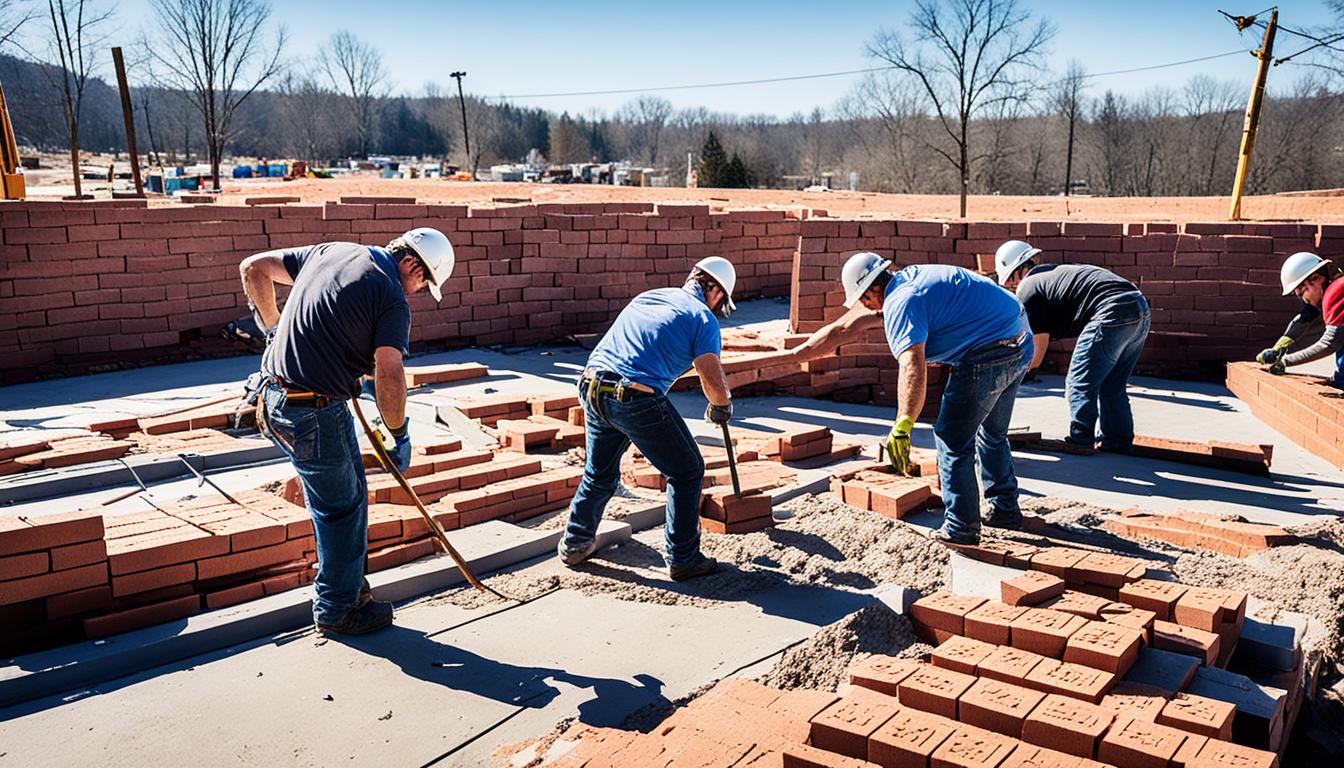Nehemiah’s Wall: Rebuilding with Purpose
Have you ever wondered what it truly means to trust God? Is it simply about praying and waiting for miracles to happen? Or does it require something more? Something practical, perhaps? The story of Nehemiah and the rebuilding of Jerusalem’s walls challenges our beliefs and invites us to reflect on the balance between faith and action.
In the book of Nehemiah, we meet a man named Nehemiah, a trusted advisor and official in the Persian Empire. When he hears about the broken-down walls of Jerusalem, he is moved to take action. But why? What is the significance of rebuilding the walls?
The connection between the temple and the wall is key. It highlights the importance of both the sacred and the secular in fulfilling God’s plan to restore the nation of Israel. Without a wall, the city was vulnerable to bandits and wild animals, and even the temple itself was at risk. Nehemiah understood this, and his decision to seek the king’s assistance in rebuilding the wall demonstrates his practical approach to his faith.
But here’s the question: How did Nehemiah reconcile his trust in God with his practical actions? Did he rely solely on prayer, or did he take tangible steps towards rebuilding the wall? The answer lies in a remarkable blend of both.
Nehemiah prayed and fasted for guidance, seeking God’s intervention in the situation. However, he didn’t stop there. He proactively sought the necessary resources, ammunition, and manpower to accomplish the task at hand. Through prayer and practical action, Nehemiah exemplified the balance between trust and responsibility, between seeking divine guidance and engaging in the work.
So, how can we apply Nehemiah’s example to our own lives? What broken-down walls in our own lives do we need to rebuild with purpose? Do we rely solely on prayer, or do we actively seek opportunities and resources to make a change?
Join us as we delve deeper into the story of Nehemiah and the lessons we can learn from his journey. Discover the power of combining prayer and practical action in our pursuit of purpose and restoration. Let Nehemiah’s story inspire us to trust God while actively working towards overcoming challenges and rebuilding what is broken.
The Importance of Walls in Ancient Jerusalem
The walls of Jerusalem played a crucial role in ensuring the city’s protection and security. Without solid walls, Jerusalem would have been vulnerable to attacks from enemies, wild animals, and bandits. It was essential to rebuild the walls in order to safeguard the city and its inhabitants.
Nehemiah, with his visionary leadership, rallied the community to undertake the formidable task of rebuilding the walls. Despite facing opposition and numerous challenges, Nehemiah’s determination and faith prevailed. The successful completion of the wall not only restored a sense of security but also served as a tangible representation of God’s blessing upon His people.
The rebuilt walls became a symbol of Jerusalem’s restoration and the renewed relationship between the Jewish people and God. They stood as a testament to the resilience and unity of the community, inspiring future generations to persevere in the face of adversity.

The Significance of the Rebuilt Walls
“Our rebuilt walls represent more than just physical fortifications. They embody our faith, resilience, and commitment to God’s plan for us. They stand as a reminder of what we can achieve when we come together in unity.”
The rebuilt walls of Jerusalem were not merely structures of stone and mortar; they carried a deeper spiritual meaning. They represented the restoration of a city that had once been broken and devastated. As the walls rose again, so did the hopes and dreams of the people.
The presence of fortified walls provided a renewed sense of security for the inhabitants of Jerusalem. It was a tangible reminder that their city, their home, was protected and safeguarded. The restored walls also served as a barrier against external threats, ensuring the safety and well-being of the community.
Moreover, the rebuilt walls symbolized the reestablishment of the Jewish people’s relationship with God. They were a testament to the faithfulness of God and His promise to protect and provide for His chosen people. The walls bore witness to the divine intervention that led to their restoration, reinforcing the spiritual connection between the inhabitants of Jerusalem and their Creator.
The Role of Prayer and Practical Action
Nehemiah’s approach to rebuilding the wall of Jerusalem exemplified the balance between prayer and practical action. He understood that true restoration requires both divine intervention and human effort.
In the midst of broken walls that had endured for over half a century, Nehemiah’s heart was burdened with a deep sense of responsibility. As a trusted advisor and high-ranking Persian official, serving as the cupbearer to the king, he recognized the urgency and importance of rebuilding the wall (Nehemiah 1:4, 1:11).
With a heart full of faith and determination, Nehemiah embarked on a journey of prayer and fasting, seeking God’s guidance and intervention (Nehemiah 1:4). He understood that prayer was not simply an act of passivity, but a powerful catalyst for action.
However, he did not stop at prayer alone. Nehemiah took practical steps to fulfill the vision that lay within his heart. He approached the king and requested letters for safe passage to Jerusalem, as well as resources for the rebuilding project (Nehemiah 2:7-8). His practical actions demonstrated his deep trust in God’s provision and his commitment to the task at hand.
Nehemiah’s practicality extended beyond mere planning and preparations. Before publicly announcing his plans, he secretly surveyed the rubble of the former wall, gaining a clear understanding of the scope and challenges of the project (Nehemiah 2:11-17). This pragmatic approach allowed him to develop a well-thought-out strategy for the reconstruction.
Recognizing that the task of rebuilding the wall was too great for him to tackle alone, Nehemiah delegated different parts of the project to various individuals, including priests, goldsmiths, and rulers (Nehemiah 3:1, 3:8, 3:12). He understood the power of teamwork and unity in achieving a common goal.
Yet, Nehemiah’s journey was not without opposition. As the walls started to rise, local leaders attempted to hinder the rebuilding effort through ridicule and threats (Nehemiah 4:6, 4:8). In response, Nehemiah led the people to pray and set up a physical guard for protection (Nehemiah 4:9). He recognized the need for both spiritual and practical measures to overcome the challenges they faced.
Throughout the adversities they encountered, Nehemiah encouraged the people to trust in God, fight for their kin, and defend their homes (Nehemiah 4:9, 4:14, 4:20). He exemplified the integration of prayer and practical action, reminding everyone of their collective purpose and the importance of relying on God’s strength.
The story of Nehemiah’s wall reveals the power of prayer that leads to practical action. Nehemiah’s unwavering faith, combined with his diligent efforts, resulted in a successful rebuilding venture. In just 52 days, he and his team accomplished what seemed impossible (Nehemiah 6:15).
Today, we can learn from Nehemiah’s example as we face our own challenges and embark on our personal rebuilding journeys. Like Nehemiah, we must seek God’s guidance through prayer but take practical actions that align with His will.
Theology of Work provides valuable insights into the restoration of the wall of Jerusalem, highlighting how Nehemiah’s combination of prayer and practical action brought about transformation. Additionally, Church Leadership offers ten powerful leadership lessons derived from Nehemiah’s story, guiding us in applying these principles to our own lives.
Let us be inspired by Nehemiah’s unwavering faith and commitment to rebuilding. May we too find the balance between prayer and practical action, trusting in God’s leading as we persist in our endeavors.
Conclusion
The completion of the wall in Jerusalem within fifty-two days is a testament to the power of purposeful action and resilient faith. Nehemiah’s unwavering determination, coupled with his practical leadership skills, enabled him to overcome opposition and rebuild the walls of the city. The restoration of Jerusalem’s walls symbolized the restoration of the city itself and the renewed relationship between its people and God.
Throughout the construction process, Nehemiah faced repeated attempts by enemies to hinder the project and spread false rumors. Despite these challenges, Nehemiah remained steadfast in his commitment to the task at hand. His example teaches us the importance of combining prayer and practical action in our own endeavors.
By seeking God’s guidance and strength, like Nehemiah did, we can actively work towards our goals, trusting that God will provide the necessary resources and protection. Just as the completion of the wall in Jerusalem required leadership, teamwork, and dedication, our own endeavors are more likely to succeed when we approach them with purpose and practicality.
Inspired by Nehemiah’s story, let us embark on our own journeys of rebuilding and restoration, utilizing both prayer and practical action to overcome obstacles and fulfill our God-given purposes. With faith and perseverance, we can rebuild the broken areas of our lives, just as Nehemiah rebuilt the walls of Jerusalem.







